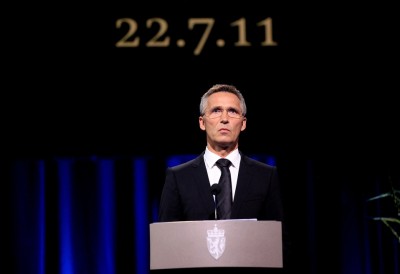Norwegian Prime Minister Jens Stoltenberg has been widely acclaimed both in and out of Norway for his leadership during last summer’ terrorist attacks. Now he faces harsh criticism, though, for statements over the weekend that could put pressure on judges handling the terrorist’s trial, which starts on Monday.

Stoltenberg gave several interviews just before the weekend on the eve of the historic court case that’s by far the biggest since Norwegian traitor Vidkun Quisling went on trial after World War II. Stoltenberg mostly talked about how the trial, which will last for 10 weeks, will be terribly difficult for many of those involved, but an important part of the healing process for what’s been a national trauma.
Stoltenberg told newspaper Dagsvisen, for example, that the trial amounts to a strong defense of Norwegian democracy and an independent court system. Norwegian officials seem keen to show the world that even the perpetrators of the most heinous crimes should have a fair trial and humane punishment.
“The upcoming trial is an expression of how the rule of law can handle the most gruesome violence Norway has seen since the war,” Stoltenberg said. “I have full confidence that it will be an honest and dignified court case where the court will, in the end, decide on the questions of punishment and (the defendant’s) mental state.”
‘Democracy under attack’
Stoltenberg has claimed all along, since the bombing of government headquarters and the massacre at his Labour Party’s youth summer camp on Utøya, that it was Norway’s democracy that was attacked.
“Then it’s even more important that we show that our democracy and our legal system function,” Stoltenberg said. “We do that by conducting a court case that shows we have a well-functioning legal system.” Even though defendant Anders Behring Breivik is bound to come with testimony that will be difficult to hear, and even though many gruesome details of Breivik’s attacks will be described in detail, “that’s the price we pay ” for democracy, Stoltenberg said.
“We’re going to hear details and opinions that will spark disgust, but that’s necessary,” Stoltenberg told Dagsavisen, again stressing the role of “an independent court system.”
Undermined own rhetoric
But on Friday evening, Stoltenberg made some additional statements that undermined all the rhetoric from earlier in the day. In an interview with TV2, Norway’s national commercial TV station, Stoltenberg said that if the court ultimately determines Breivik to be sane (tilregnelig, in Norwegian), “I think that many will feel a sense of relief.” Breivik’s lead defense attorney also said during the weekend that if Breivik is sentenced to prison on the basis of being sane, it was unlikely he would appeal, thus bringing an end to the nation’s legal nightmare.
Stoltenberg said it may be easier for many, especially the survivors and families of Breivik’s victims, if Breivik is ruled sane and sentenced to prison, than ruled insane and committed to psychiatric care.
“So for all the victims, for all who were affected, I think it will be an advantage if the court says he was sane,” Stoltenberg told TV2.
And then came the reaction that Stoltenberg’s comments were “almost scandalous,” according to newspaper Aftenposten, for example, because a prime minister in a democracy “should never say anything like that.” Stoltenberg, raged the critics, had no business “tramping into the judicial branch’s territory.”
Some observers have already questioned whether the 10-week trial beginning on Monday is a “farce,” because there’s no question Breivik carried out the attacks. Everyone knows he’s guilty. The only real question for the court is the state of his sanity, and what kind of punishment he should receive.
Others view the trial as a sort of national catharsis, something the nation has to go through before moving on. Many dread the whole process, which will last until late June. A verdict is due no later than July 20.
Views and News from Norway/Nina Berglund
Please support our stories by clicking on the “Donate” button now:

